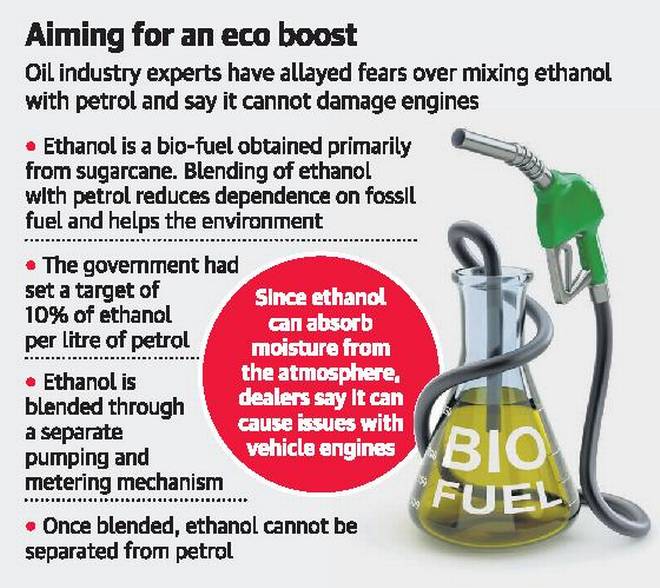Ahmedabad
(Head Office)Address : 506, 3rd EYE THREE (III), Opp. Induben Khakhrawala, Girish Cold Drink Cross Road, CG Road, Navrangpura, Ahmedabad, 380009.
Mobile : 8469231587 / 9586028957
Telephone : 079-40098991
E-mail: dics.upsc@gmail.com

Ethanol Blending
News: Prime Minister Narendra Modi on Saturday announced that India has commenced the rollout of 20% ethanol-blended petrol this year and the country's aim is to cover the entire nation by 2025.
India’s Ethanol Blending Programme:
• Ethanol (ethyl alcohol) is a biofuel. It is formed by the fermentation of sugar sourced from sugarcane or other organic matter like food grains.
• India started ethanol blending programme in 2003 with an aim to blend 5% ethanol in petrol in nine States and four UTs.
• The ‘National Policy on Biofuels’, 2018 envisaged an indicative target of 20% ethanol blending in petrol (E20) by 2030. It has now been preponed to 2025.
How will India achieve its E20 target by 2025?
• Diversified Feedstocks –In addition to sugarcane many mills/distilleries now use various feedstocks such as B-heavy molasses, direct sugarcane juice, rice, maize, and other grains.
• Increased Production - The country’s ethanol supply to oil marketing companies (OMCs) rose significantly from 38 crore liters in 2013-14 to 559 crore liters in 2022-23. This growth indicates a robust production system in place.
• Higher Yields from Grains - Grains give higher ethanol yields compared to molasses. For instance, rice produces 450-480 liters from one ton, while maize gives 380-400 liters. These higher yields can boost overall ethanol production.
• Consistency in supply of ethanol throughout the year as some companies have innovated technologies where distilleries operate on multiple feedstocks throughout the year.
What are the challenges in ethanol blending?
• Sugarcane is a water intensive crop. Promoting its cultivation may deplete our groundwater.
• Cost of flex-fuel vehicles would be higher compared to ordinary vehicles.
• Producing ethanol will continue to release Carbon dioxide emissions thus net benefit depends on how ethanol is made.
• Transport of ethanol to different places for blending will increase the cost of logistics and transport related emissions.
Way Forward
• Promote alternatives to sugarcane to produce ethanol.
• Higher ethanol blends can be provided with tax benefits just as how electric vehicles are encouraged.

Address : 506, 3rd EYE THREE (III), Opp. Induben Khakhrawala, Girish Cold Drink Cross Road, CG Road, Navrangpura, Ahmedabad, 380009.
Mobile : 8469231587 / 9586028957
Telephone : 079-40098991
E-mail: dics.upsc@gmail.com
Address: A-306, The Landmark, Urjanagar-1, Opp. Spicy Street, Kudasan – Por Road, Kudasan, Gandhinagar – 382421
Mobile : 9723832444 / 9723932444
E-mail: dics.gnagar@gmail.com
Address: 2nd Floor, 9 Shivali Society, L&T Circle, opp. Ratri Bazar, Karelibaugh, Vadodara, 390018
Mobile : 9725692037 / 9725692054
E-mail: dics.vadodara@gmail.com
Address: 403, Raj Victoria, Opp. Pal Walkway, Near Galaxy Circle, Pal, Surat-394510
Mobile : 8401031583 / 8401031587
E-mail: dics.surat@gmail.com
Address: 303,305 K 158 Complex Above Magson, Sindhubhavan Road Ahmedabad-380059
Mobile : 9974751177 / 8469231587
E-mail: dicssbr@gmail.com
Address: 57/17, 2nd Floor, Old Rajinder Nagar Market, Bada Bazaar Marg, Delhi-60
Mobile : 9104830862 / 9104830865
E-mail: dics.newdelhi@gmail.com